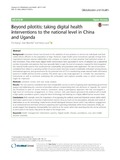Beyond Pilotitis: Taking Digital Health Interventions to the National Level in China and Uganda
| dc.contributor.author | Huang, Fei | |
| dc.contributor.author | Blaschke, Sean | |
| dc.contributor.author | Lucas, Henry | |
| dc.coverage.spatial | China | en |
| dc.coverage.spatial | Uganda | en |
| dc.date.accessioned | 2018-04-30T13:30:01Z | |
| dc.date.available | 2018-04-30T13:30:01Z | |
| dc.date.issued | 2017-07-31 | |
| dc.identifier.citation | Huang, F., Blaschke, S., Lucas, H. (2017) Beyond Pilotitis: Taking Digital Health Interventions to the National Level in China and Uganda. Globalization and Health. (13) 49. | en |
| dc.identifier.uri | https://opendocs.ids.ac.uk/opendocs/handle/20.500.12413/13670 | |
| dc.description.abstract | Innovation theory has focused on the adoption of new products or services by individuals and their market-driven diffusion to the population at large. However, major health sector innovations typically emerge from negotiations between diverse stakeholders who compete to impose or at least prioritise their preferred version of that innovation. Thus, while many digital health interventions have succeeded in terms of adoption by a substantial number of providers and patients, they have generally failed to gain the level of acceptance required for their integration into national health systems that would promote sustainability and population-wide application. The area of innovation considered here relates to a growing number of success stories that have created considerable enthusiasm among donors, international agencies, and governments for the potential role of ICTs in transforming weak national health information systems in middle and low income countries. This article uses a case study approach to consider the assumptions, institutional as well as technical, underlying this enthusiasm and explores possible ways in which outcomes might be improved. | en |
| dc.language.iso | en | en |
| dc.publisher | BioMed Central | en |
| dc.rights | © The Author(s). 2017 Open Access This article is distributed under the terms of the Creative Commons Attribution 4.0 International License (http://creativecommons.org/licenses/by/4.0/), which permits unrestricted use, distribution, and reproduction in any medium, provided you give appropriate credit to the original author(s) and the source, provide a link to the Creative Commons license, and indicate if changes were made. The Creative Commons Public Domain Dedication waiver (http://creativecommons.org/publicdomain/zero/1.0/) applies to the data made available in this article, unless otherwise stated. | en |
| dc.rights.uri | http://creativecommons.org/licenses/by/4.0/ | en |
| dc.subject | Health | en |
| dc.title | Beyond Pilotitis: Taking Digital Health Interventions to the National Level in China and Uganda | en |
| dc.type | Article | en |
| dc.rights.holder | The authors | en |
| dc.identifier.externaluri | https://globalizationandhealth.biomedcentral.com/articles/10.1186/s12992-017-0275-z | en |
| dc.identifier.team | Health and Nutrition | en |
| dc.identifier.doi | https://doi.org/10.1186/s12992-017-0275-z | |
| dcterms.dateAccepted | 2017-07-12 | |
| rioxxterms.funder | Default funder | en |
| rioxxterms.identifier.project | Future Health Systems | en |
| rioxxterms.version | VoR | en |
| rioxxterms.versionofrecord | https://doi.org/10.1186/s12992-017-0275-z | en |
| rioxxterms.funder.project | 50c0b576-b4b1-402e-a6cd-50d73c1d4430 | en |
Files in this item
This item appears in the following Collection(s)
Except where otherwise noted, this item's license is described as © The Author(s). 2017 Open Access This article is distributed under the terms of the Creative Commons Attribution 4.0 International License (http://creativecommons.org/licenses/by/4.0/), which permits unrestricted use, distribution, and reproduction in any medium, provided you give appropriate credit to the original author(s) and the source, provide a link to the Creative Commons license, and indicate if changes were made. The Creative Commons Public Domain Dedication waiver (http://creativecommons.org/publicdomain/zero/1.0/) applies to the data made available in this article, unless otherwise stated.


